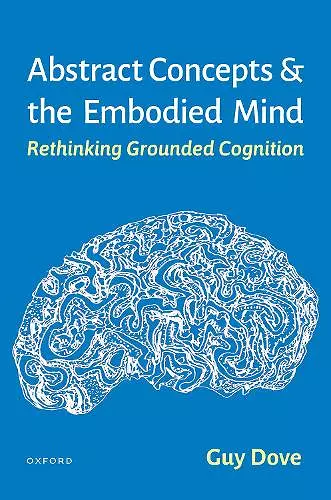Abstract Concepts and the Embodied Mind
Rethinking Grounded Cognition
Format:Hardback
Publisher:Oxford University Press Inc
Published:13th Apr '22
Currently unavailable, and unfortunately no date known when it will be back

Our thoughts depend on knowledge about objects, people, properties, and events. To think about where we left our keys, what we are going to make for dinner, when we last fed the dogs, and how we are going to survive our next visit with our family, we need to know something about locations, keys, cooking, dogs, survival, families, and so on. As researchers have sought to explain how our brains can store and access such general knowledge, a growing body of evidence suggests that many of our concepts are grounded in action, emotion, and perception systems. We appear to think about the world by means of the same mechanisms that we use to experience it. Yet, abstract concepts like 'democracy,' 'fermion,' 'piety,' 'truth,' and 'zero' represent a clear challenge to this idea. Given that they represent a uniquely human cognitive achievement, answering the question of how we acquire and use them is central to our ability to understand ourselves. In Abstract Concepts and the Embodied Mind, Guy Dove contends that abstract concepts are heterogeneous and pose three important challenges to embodied cognition. They force us to ask: How do we generalize beyond the specifics of our experience? How do we think about things that we do not experience directly? How do we adapt our thoughts to specific contexts and tasks? He further argues that a successful theory of grounding must embrace multimodal representations, hierarchical architecture, and linguistic scaffolding. Focusing on a topic that has generated a lot of recent interest, this book shows that abstract concepts are the product of an elastic mind.
In sum, this is the first book-length treatment of specifically abstract embodied concepts and an invaluable resource for a wide range of audiences: philosophers, psychologists, linguists, neuroscientists, and lay people interested in concepts. Dove's extensive empirical overviews that underpin his proposals are a rich synthesis of the state of the art in the different research strands and he discusses a wide range of available theories. * Christian Michel, Philosophical Psychology *
Drawing on both classic and current research in linguistics, philosophy, psychology, and neuroscience, Guy Dove not only identifies the pros and cons of numerous positions on numerous issues involving the mental and neural representation of abstract concepts, but also builds a novel, multidimensional, and compelling framework that will provide much-needed guidance for this rapidly accelerating field of study. * David L. Kemmerer, Professor of Cognitive Psychology and Neuroscience, Purdue University *
The challenges posed by abstract concepts have never been so forcefully articulated. Drawing on the latest findings in multiple fields, Dove crafts a lens through which the path forward becomes gleamingly clear. Essential reading for anyone interested in the building blocks of thought. * Jesse Prinz, Distinguished Professor of philosophy, City University of New York, Graduate Center *
A wonderful book, a must-read for people interested in abstract concepts, but more generally in how we think and speak. It is written compellingly, has a very clear structure, and is a pleasure to read. Guy Dove highlights our conceptual system's elasticity, multimodality, and contextual dependency. Concepts rely on experience, as grounded approaches posit. However, the time has come to stretch grounded approaches, showing that concepts reuse experience but in a flexible way and underlining the role of language in enhancing cognition. This book opens new exciting research avenues and reminds us of the limits of dichotomic thinking about language, concepts, and knowledge. * Anna Borghi, Associate Professor of Psychology, Sapienza University of Rome *
It will be of interest to graduate students and researchers in linguistics, philosophy, neuroscience, and cognitive science. * Choice *
ISBN: 9780190061975
Dimensions: 242mm x 162mm x 21mm
Weight: 526g
280 pages